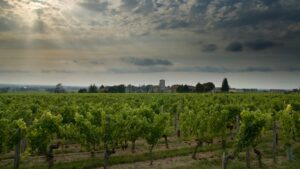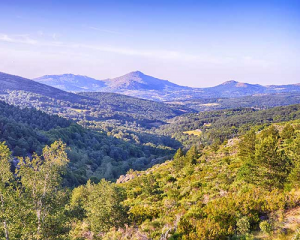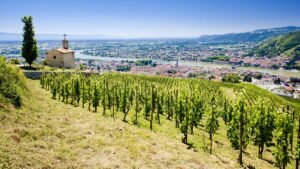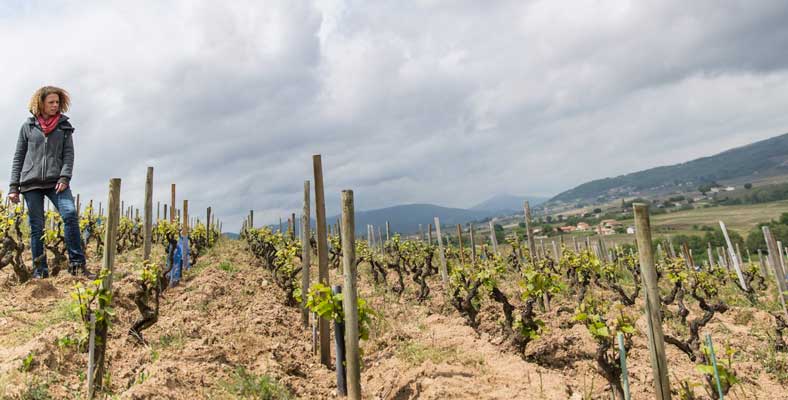 Domaine Marcel Lapierre has fast become an undisputed benchmark of Beaujolais and a driving force in the world of natural wine since 1980. A look at this extraordinary domain.
Domaine Marcel Lapierre has fast become an undisputed benchmark of Beaujolais and a driving force in the world of natural wine since 1980. A look at this extraordinary domain.
Founded at the beginning of the 20th century, Domaine Marcel Lapierre is a family run affair that has been handed down from father to son for generations. It was Michel Lapierre who settled in Villé-Morgon and became cellar master of Domaine des Chênes. After WWII, his son Camille took over and by the end of the 1950s he was bottling the production himself and expanding the domain. In 1973, Camille passed the now seven hectares of vines to his son Marcel Lapierre. Marcel made major changes and his legacy has left an indelible mark on the winemaking landscape in Beaujolais and in natural wines.
Marcel Lapierre: a trailblazer who brought back tradition
At a time when the excessive use of chemical products, high yields and standardised wines were the status quo and terroir was hidden behind exogenous yeasts, Marcel Lapierre arrived with a truly different and visionary approach. From 1981, and with the help of Jules Chauvet (researcher, oenologue and negociant), Marcel began to vinify his wines without the use of SO2 or selected yeasts and cultivated his wines according to biodynamic methods. Often described as the father of natural wines, it was Marcel who brought new life to the wines of Beaujolais and his work inspired a generation of winemakers such as Jean Foillard, Georges Descombes.
Mathieu Lapierre added that “the natural wine movement has been very present in the Beaujolais thanks to a motivated group of winemaking committed to changing the status quo. At the time, winemaking was dictated by what the universities taught and didn’t give the winemakers much liberty. I think that socio-economic reasons were a driving force behind this movement. At the time vines were accessible to young winemakers and the region was dominated by the production of low range wines by negociants, leaving plenty of scope to do something different such as make high quality wine. Jules Chavet had an important part to play in all this: he helped winemakers master their vinifications. Marcel Lapierre wanted a return to the natural wines that were traditionally made in the region and that some old winemakers were still doing. It was a bet, and in the Beaujolais it was a bet that paid off”.
After his death in 2010, his son Mathieu Lapierre took over the running of the domaine with the help of his sister Camille and their mother Marie. Together, they keep the family tradition and savoir faire alive by continuing to produce fine Beaujolais wines that respect Marcel’s biodynamic and natural philosophy.
A new generation flying the flag
To the great pleasure of many wine enthusiasts, Mathieu and Camille Lapierre have preserved their father’s philosophy and continue to produce exceptional wines.
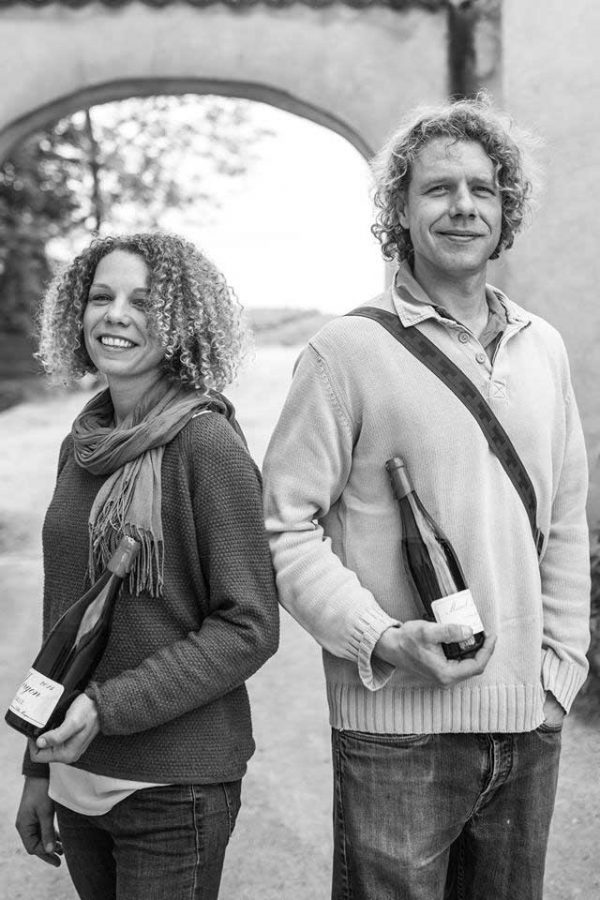
The vineyard spans 16 hectares in the Villié-Morgon and Côte du Py communes and has been cultivated organically since 1981. The vines are aged around 60 years and the domaine places great importance in respecting the micro-biology of the soil: only a very small dose of copper and sulphur are added to the soil.
As you can imagine, a hands-off approach is also taken in the cave at Domaine Lapierre. Nothing at all is added to the grape juice. The vinifications are carried out in the classic style (the whole grape undergoes the traditional Beaujolais method of carbonic maceration without the use of SO2) and the wines are then matured masterfully in oak that is 3 to 13 years old. The tools used are also traditional: wooden vats, horizontal presses… The domaine produces only one cuvée (a common practice in the region) but in two different version: one without sulphur and one with a very small dose of sulphur.
“We’re not anti-sulphur”, explains Mathieu Lapierre, “we vinify without SO2 because it’s during vinifcation that sulphur has the biggest impact on the wine, while during bottling it’s less of a problem. But we aren’t dogmatic about this and we vinify without sulphur where possible (in 20 years we’ve only intervened two times). To produce a sulphite-free wine and a wine with a little sulphur repsonds to two different needs: it can you preserve or transport the wine. But we aren’t at war with oenology, the worst thing about oenology is its habit of systemising everything, telling what products to use every year like some sort of recipe. The natural wine movement is a philosophy rather than a rule book. Everyone has their own definition of a natural wine and the idea is that winemakers try to produce the healthiest harvest possible so it’s not just the fermentation that reveals the complexities of the wine. It’s a movement in opposition to technical wines”.
Domaine Lapierre truly is one of the most emblematic domains in the Beaujolais and its wines have a firm place in the canon of fine Beaujolais. Be warned, the fresh fruit characteristics of these wines, not to mention the aerial and fresh qualities make them highly addictive!
The wines from Domaine Marcel Lapierre currently on sale
Vin de France Raisins Gaulois 2017:
The Raisins Gaulois cuvée comes from young Gamay vines. Drink this fresh and fruit forward wine young to enjoy the full expression of red fruit aromas.
Morgon 2017 / 2016 :
A blend of several terroirs in the appellation with poor soils that gives its notes of violet and black cherry. A beautiful Morgon to be enjoyed in the 3 to 8 years following its vintage.
A magnificent Morgon, an explosion of fruit from a producer who has inspired a whole generation of winemakers.
A magnificent Morgon, an explosion of fruit from a producer who has inspired a whole generation of winemakers.
See all the wines from Domaine Marcel Lapierre currently on sale
See all Beaujolais wines currently on sale
See all wines currently on sale


